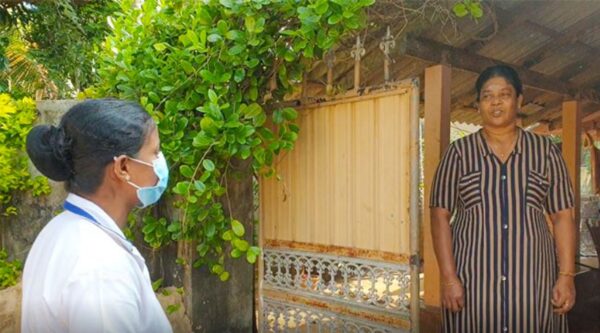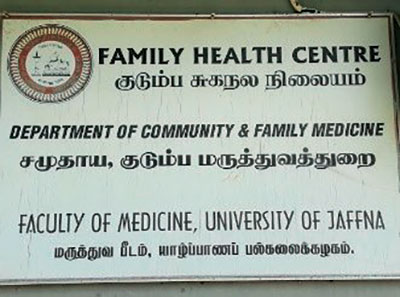Much-needed Family Health Care Centre for Jaffna-BY Consultant Family Physician, Dr. S. Kumaran, and Viduni Basnayake

Source:Island
This article describes the experiences of a novel, evidence-based approach that involves patients, and their family members, in delivering health care, providing medical education, and conducting research, at a primary care institution, called a Family Health Care Centre.
The Northern Province, in Sri Lanka, is a war-ravaged region that lags behind the rest of the country, in economic development.
After the COVID-19 pandemic had already squeezed the health services of its limited resources, the current financial crisis has pushed the sector to the brink of collapse. This crisis puts patients at further risk due to power outages, a lack of medicine, and equipment shortages. Another major issue, caused by the economic collapse, is the shortage of human resources. In addition, frequent protests, brought on by political unrest, disrupt the provision of health services.
Primary care is the provision of integrated, accessible healthcare services, by physicians and their support teams, to patients, while developing a sustained relationship with patients, within the family and community. The care is person-centered, team-based, communit-aligned, and designed to achieve better health, and better care, at lower costs. Family Medicine is the focal point of primary care and, unlike other specialties that focus on a specific organ or disease, Family Medicine is a field in which physicians treat most ailments and provide comprehensive healthcare to people of all ages – from newborns to seniors.
In Sri Lanka, the delivery of primary care is no easy task. Inadequate human resources, limited infrastructure (buildings, furniture, labs and equipment), lack of a multidisciplinary approach in team work, inadequate government policies and fund allocation, and the lack of awareness of primary care services, among the general population, are the main obstacles. The delivery of health services is made more challenging by patients who have multiple health issues, complicated psychosocial problems, transportation issues from their homes to healthcare facilities, and a lack of awareness of their medical conditions. The preventive sector is often overlooked in times of crisis, which makes the situation worse.
Research studies play a major role in primary care as the findings can be used for the betterment of public health-related issues. But, such studies have become challenging due to inadequate public participation that affects the data collection, and insufficient funding to carry out research. When the healthcare system is in crisis, clinical medicine will receive more attention than research. Further, most doctors also shift their attention away from research.
Despite the challenges outlined above, Sri Lanka’s one of effective Family Health Care Centre was established in the newly built maternity block of the District Hospital, Kondavil, with the full support of the hospital’s District Medical Officer (DMO) and the Regional Director of Health Services (RDHS), Jaffna. The authors created the basic structural drawings and the final plan was agreed, after several discussions with the authorities of both Provincial Ministries of Health and academics of the Faculty of Medicine, University of Jaffna, in 2012. The centre is an extended arm of the Department of Community and Family Medicine, Faculty of Medicine, University of Jaffna.
The centre welcomed young, unemployed family members, who had ceased their formal education after the secondary level. Job titles were created, based on their identified areas of interest. The job training provided, helped in capacity building, as well as social recognition. These trained community members play a variety of roles in the delivery of FHC services as noted below.
Community health assistant in home-based geriatric care:
Home-based geriatric care is one of the services provided by the Family Health Centre, Kondavil, for patients who are unable to visit the hospital for various reasons, such as elderly or bedridden conditions. Young women, introduced by patient forums, were trained to register the chosen elders for home care, locate the homes, schedule monthly visits, indicate drug delivery dates, and maintain the home-visit bag and equipment in a calibrated manner.
Health assistant for community-based geriatric care:
 The community-based geriatric care is conducted by a group of trained members. During the programme, screening for NCD/Non communicable diseases and many activities, related to improve the mental health, are carried out.
The community-based geriatric care is conducted by a group of trained members. During the programme, screening for NCD/Non communicable diseases and many activities, related to improve the mental health, are carried out.
Health assistants for non-communicable disease clinics:
As a part of the community members’ involvement in routine clinical activities, young women were trained to be health assistants for non-communicable disease clinics.
Peer educators:
These personnel received training to conduct patient education both during FHC clinical operations and during community outreach activities. They teach patients diabetic foot care, basic level breathing exercises, basic level physiotherapy for stroke patients and required home modifications, proper way of using spacer, etc.
Play therapy assistants:
Children, who fall under the Autistic spectrum, display a variety of social, behavioral and developmental challenges throughout their childhood. The therapy assistants were trained for a period of six months, by experts, to deal with such children. These young women were trained to engage in child-centered play activities that help them develop gross motor, fine motor, creative, life and pre-learning skills. It began with six young women, in 2018, and there are 10 women in the group now.
Healthy diet promotion programme:
A few empowered mothers are involved in increasing the availability, accessibility and affordability of nutritious food, in Kondavil village. They prepare food, in a hygienic manner, and pack it in biodegradable paper bags, or tissues. They also provide food delivery services.
Helpline and telemedicine services:
The helpline service was created to serve populations that are not covered by the FHC, Kondavil. The helpline deals with clinical and non-clinical questions for a population of 10,000 in the Northern Province, in collaboration with NICST, an NGO that provides financial and technical support. It helps to conduct follow-ups on a regular basis. People who want to see the consultant or a doctor can schedule an appointment on Wednesdays, between 10am to 12pm and join through telemedicine for the medical inquiries.
Satellite centre clinics:
Consultants from the Teaching Hospital, Jaffna, who wish to conduct village-level medical campaigns, have teamed up with the FHC to organize annual satellite centere clinics, in rural villages, in the Northern Province, along with the Faculty of Medicine, University of Jaffna. The satellite centre clinics are going to function in Divisional Hospitals in Tharmapuram (Killinocchi District) and Palai (Jaffna District).
The patients’ relative are trained in such a way to act as simulated patients. This trained simulated patients are mainly to help to teach medical student on communication, counselling and consultation skill. Sharing experience with medical students, the trained therapy assistants share their experience of caring for autistic children and their parents with medical students.The helpline operators share their experience with the medical students. Involving in enhancing medical student and staff wellbeing. Few trained patients’ relatives conduct regular programmes with medical students and staff to improve their wellbeing. The programme include laughter yoga, forum theater drama and many relaxation techniques. Further, patients and their relative’s involvement in writing books and supporting research could also can seen.







